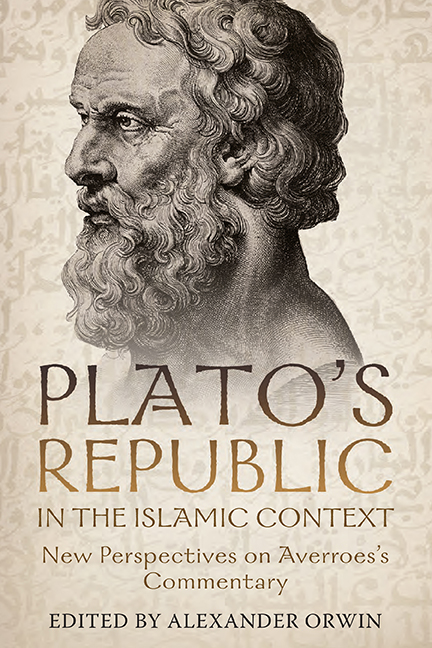Book contents
- Frontmatter
- Dedication
- Contents
- Introduction
- Part One Averroes and His Teachers
- Part Two Poetry, Philosophy, and Logic
- Part Three Law, Religion, and Philosophy
- Part Four Wisdom, Government, and the Character of the Political Community
- Part Five Averroes’s Reception in Europe
- Selected Bibliography
- Notes on the Contributors
- Index
14 - The Two Hebrew-into-Latin Translations ofAverroes’s Commentary on Plato’s “Republic”: Method,Motivation, and Context
Published online by Cambridge University Press: 26 May 2022
- Frontmatter
- Dedication
- Contents
- Introduction
- Part One Averroes and His Teachers
- Part Two Poetry, Philosophy, and Logic
- Part Three Law, Religion, and Philosophy
- Part Four Wisdom, Government, and the Character of the Political Community
- Part Five Averroes’s Reception in Europe
- Selected Bibliography
- Notes on the Contributors
- Index
Summary
Introduction
Averroes's Commentary on Plato's“Republic” was translated twice intoLatin; both translations were made from the Hebrewversion of Samuel ben Judah of Marseille. The firsttranslation was done by Elijah Del Medigo (ca.1455–93), a Crete-born Jew, who spent most of hislife in northern Italy, Crete being at that timeunder Venetian rule. Although a devout Jew, DelMedigo's immediate intellectual milieu wasChristian, mostly made up of figures related in someway to the university of Padua and to powerfulcircles in Venice. Most of Del Medigo's literaryoutput was in Latin—including his Hebrew-into-Latintranslation of Averroes's Commentary on Plato's “Republic”—and hehimself translated some of his own original Latinworks into Hebrew. Thematically, Del Medigo focusedalmost solely on the works of Averroes. Histranslation of Averroes's Commentary on Plato's “Republic” waspart of his general endeavour of translating andcommenting on the works of Averroes, while workingat the service of his Christian patrons—namely,Giovanni Pico della Mirandola and Domenico Grimani.On his return to Crete, toward the end of his life,Del Medigo composed his Hebrew work Beḥinat haDat, which becamehis most celebrated work. In that work Del Medigoexamines the relation between Judaism and rationalthought, determining the rational nature of Judaismas opposed to the irrational character of Christiandogmas.
The second translation was by the Jewish physician andtranslator Jacob Mantino (d. 1549). Mantino, aJewish physician who lived most of his life inItaly, had close relationships with bishops andcardinals to whom he dedicated several of histranslations and he was the personal physician toPope Paul III. Mantino translated many of Averroes'scommentaries, and was, according to Dag Hasse, “themost prolific and most acclaimed among allRenaissance translators of Averroes.”
Del Medigo's translation was never printed during theRenaissance; it was discovered by Paul OscarKristeller in a Siena manuscript and published as acritical edition in 1992. Mantino's translation,first published in 1539, was printed four timesduring the Renaissance, yet has never received amodern edition. This chapter begins with a generaloverview of the two translations, discussing theirdifferent nature in light of the differentcircumstances surrounding their production.
- Type
- Chapter
- Information
- Plato's Republic in the Islamic ContextNew Perspectives on Averroes's <i>Commentary</i>, pp. 297 - 318Publisher: Boydell & BrewerPrint publication year: 2022



